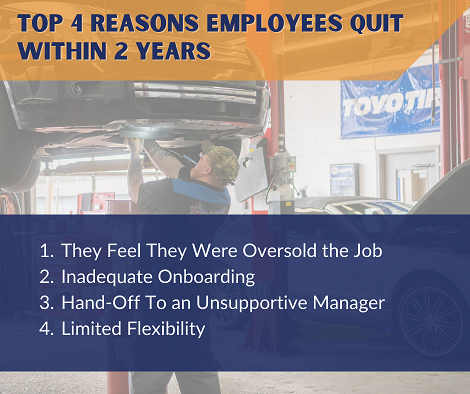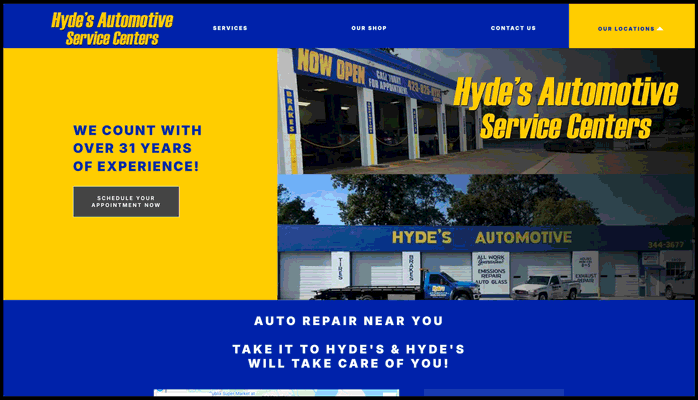As hard as it is to recruit technicians these days, you want to do everything you can to be sure they will have a long, successful tenure at your shop. Unfortunately, the early quit rate (within two years of starting) is painfully high for employers in almost all industries.
The first few weeks and months that somebody is working at your shop has a huge impact on how long they are likely to stay with you. Just like building a house, you are setting a foundation in those early days. Build a strong one and that house will stand for a good, long time. Fail to invest in your materials or take shortcuts and the first strong wind may take that house down.
So how do you avoid the vicious cycle of hire, train, quit, rehire? Or more likely, the much worse recruit, recruit, recruit, hire, train, quit, recruit, recruit, recruit, rehire? Bruce Tulgan and his Rainmaker Thinking workplace research team have decades of research on this topic so we’ll take a good look at what they’ve identified as the top four causes of early departures and how to avoid those issues at your shop.

#1 – Buyer’s Remorse or They Feel They Were Oversold the Job
This is where the employee feels like they were presented with a beautiful vision of what the job would be, but they start and the job is actually very different. They were sold on a family-like atmosphere where everybody supports each other, but from day one they can tell that’s really not how the shop operates. And it appears like the other techs don’t like each other at all.
How to Avoid It
You’ve got to be open and honest in the hiring process. Getting a candidate to buy in to a false reality only sets them up for disappointment and failure and puts you on track to live in the vicious cycle of rehiring.
If you have challenges, you should share that with potential hires as you get closer to hiring them. That doesn’t mean you have to share all the dirty laundry but let them know what life is really like in the shop. If you are making efforts to improve things, let them know that they are part of the solution and give them the vision of what you are working toward. In those cases, be sure that you are communicating with them consistently.
#2 – Inadequate Onboarding
It starts on day one and only gets worse from there. A new employee comes in but there is clearly no plan for how to get them up to speed and what they should focus on. Nobody helps them connect to the mission, vision and values, or their colleagues at the shop. Demands start coming at them before they even understand shop procedures.
Four weeks in and it hasn’t gotten any better. They’ve only found out about things when they’ve asked other techs. There is no open line of communication to management. Their biggest influence is the most disgruntled tech in the shop.
How to Avoid It
Create a documented onboarding schedule that will set them up for success. No matter how big or small your shop is, this can have a big impact. You are making a big investment in a person. You want to be sure you are doing everything you can to help them be successful. Think through what they need to know, who do they need to have as a resource, what processes will be critical to their job, what are the expectations for how they communicate to customers, and more.
What do they need to do on day one? What should they know by the end of week one? What do they need to know by the end of the first month? Set up their schedule and give them time for all these things.
I know – you are hiring a tech because you’ve got more work than you can handle and you need them to be productive right away. That’s understandable. But take the time to make this a solid four to eight year investment instead of a four to eight week waste of time.
#3 – Hand-Off to a Disengaged or Unsupportive Manager
You’ve got the new tech fired up to join your team and you’ve presented a picture of what life will be like at your shop. And even on day one you’ve spent most of the day with the new employee and it’s been good. But on day two they get handed off to their actual supervisor, the shop manager, who doesn’t express the same enthusiasm. In fact, they seem to be only focused on getting the work done at all costs – no breaks, no leaving a couple hours early to see a child’s school performance, no “thank-yous” or recognition for a job well done.
How to Avoid It
First, be sure the supervisor/manager is involved in the hiring process. You want to give the potential employee and the manager the chance to connect (or not) and make a good decision based on the result.
This can also fall in the overselling category. Don’t set your manager up for failure by underselling how much work there is to the potential employee.
Finally, make sure you and anybody who will be managing employees at your shop are on the same page. Managing managers is a critically important job. You’ve got to make sure they are aligned with your values and beliefs and are demonstrating those to their direct reports. It’s a well-known truth that people don’t leave organizations they leave managers. If you have a manager that is not managing well, you’ve got to coach them up or coach them out.
#4 – Limited Flexibility
This one can be tough for an auto repair shop, but it is often a significant advantage that independent auto repair shops have over dealerships. Regardless, a tech can’t work from home. But this applies to more than just work location and in a shop could apply to types of jobs, schedules, training, and other things.
How to Avoid It
The key here is to set expectations early on. Let the incoming tech know where the guardrails are on flexibility. Do what you can to be flexible and be open to new ideas. You don’t have to provide the exact same type of flexibility to each and every employee. Understand what matters most to each individual and accommodate and reward them in that way.
Understanding these top four reasons employees quit before they reach their second anniversary can help you put measures in place to avoid it happening in your shop. By conducting a thorough, open and honest hiring process and considering the employee experience when they join your shop, you can set new techs, and your shop, up for long term success.
To learn how Repair Shop Websites can help you bring more vehicles into your shop, and promote your job openings, call us at 855-294-6397 or email us at Team_RSW@RepairShopWebsites.com.

